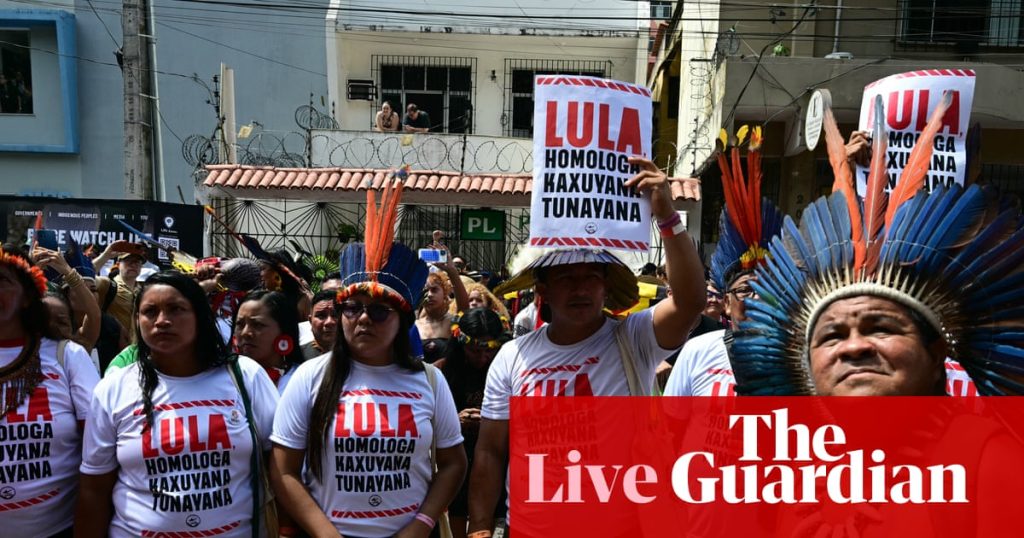And while we are looking at industry lobbyists and their impact on Cop30 my colleague Nina Lakhani wrote this piece over night on big agriculture’s presence at these negotiations.
Share

Damian Carrington
Big oil is still trotting out the climate denial trope that “the climate has always changed” here at Cop30..
TotalEnergies chief executive Patrick Pouyanne was confronted by a Greenpeace campaigner, after speaking on a panel.
The encounter was reported by AFP:
The Greenpeace activist demanded the fossil fuel industry compensate victims of extreme weather events.
“There have been cyclones in the Caribbean for decades,” Pouyanne retorted.
When told they were “accelerating,” he replied: “I am not a scientist.”
“I am not a meteorologist,” Pouyanne said when asked by AFP about science showing hurricanes are becoming more intense.
“I simply observe that, unfortunately, there were (cyclones), there are still (cyclones) and there will be more.”
Russia’s Cop30 negotiator also sought to ignore the clear and present dangers of the climate crisis: “If we start living without fossil fuels, even people in [rich nations] will suffer, believe me.”
Share
As we wait for things to swing into action in Belem my colleague Damian Carrington says protesters were out in force around Cop30 conference centre as he made his way in this morning – including one group holding a sign that read “we’ll be less activist if you’ll be less shit” – a fairly direct challenge to those inside the venue as negotiations resume.
Share
Updated at 07.25 EST
Brazilian president Luiz Inácio Lula da Silva is due to fly back to Belém on Wednesday as momentum surged behind efforts to include a roadmap for phasing out fossil fuels and ending deforestation as one of the key outcomes of Cop30.
More than 80 countries have put their weight behind moves to plot a path out of the era of coal, oil and gas, though they face strong resistance from petrostates and other major economies in the remaining few days of the negotiations.
The task now for Lula will be to persuade China and India to back the proposal, and to get support from the European Union to provide extra finance. Only then will this historical political mandate be possible.
The Brazilian presidency of COP30 insists the global talks will end as scheduled on Friday, but with other key topics, including finance and trade, also unresolved, this will require huge breakthroughs. It would also break a sequence of COP overruns stretching back more than 20 years.
Observers have been encouraged that the main negotiating text is relatively “clean”, which means that, compared to previous years, there are fewer brackets denoting areas of disagreement.
A transition away from fossil fuels was not included in the agenda for this conference, but Lula has spelled out in three previous speeches here in Belém that he wants a roadmap to be among the results. The return of this global south figurehead will add impetus to the negotiations and could help to secure support from China, a Brics ally whose president Xi Jinping has stressed support for the COP presidency and multilateral decision making.
A roadmap for eliminating the main source of the emissions that are heating the world could potentially constitute significant progress, but the devil will be in the detail. Some advocates fear the current wording is too vague to be effective. They want it to have measurable goals and clear action plans.
For this to have any chance of success, Cop30 will also have to move forward on the vexed issue of finance. Wealthy industrialised economies, which are most to blame for climate breakdown, have agreed to help developing countries with the energy transition and adapt to the already dire consequences of climate breakdown. But the commitments so far have fallen short of what is needed and many of the promised funds have yet to materialise.
The need for urgent action has been made apparent by the presence of indigenous leaders and scientists and at the conference. Forest people have spelled out how their territories have suffered from devastating droughts in recent years, as well as land invasions and illegal mining. Climatologists have warned that the Amazon and other biomes are fast degrading towards a point of no return that would have dire global consequences.
If Belém can encourage nations to fulfill their promises, this situation would look a less less bleak. This morning, a new analysis by Climate Action Tracker coalition revealed the
the rate of global heating could be cut by a third in the next decade if governments simply honoured their existing commitments to triple the amount of renewable energy generated by 2030, double global energy efficiency by the same date, and make substantial cuts to the powerful greenhouse gas methane.
The Brazilian hosts of Cop30 have described this as the “action summit.” Over the next three – or more – days, we will find out how much it can deliver.
Share
Good morning, it is Matthew Taylor here and I will be hosting the liveblog for the next few hours, keeping across all the latest developments from Cop30 in Brazil.
Share

